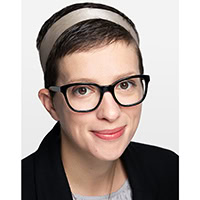
The AHA Townhouse
We were still shaking hands when I interviewed at the AHA townhouse in early March. By the time I accepted the position as Perspectives on History’s new editor, Philadelphia, where I’m based, had been on a stay-at-home order for a few days. I still thought I’d be in Washington, DC, by midsummer and would soon lead lively editorial board meetings in person, share printed proofs with the magazine’s managing editor, or write my editor’s note from the comfort of a café.
Although how and where I do my work has changed a great deal because of the pandemic, the why has not. Despite everything that COVID-19 has upended, Perspectives continues to cultivate the community of historians and promote our work.
Community building takes many forms. Our team worked with the three winners of Perspectives’ graduate student summer column contest—Rachel Basinger (Norwich Univ.), Allison Robinson (Univ. of Chicago), and Leah Valtin-Erwin (Indiana Univ. Bloomington)—to prepare six articles for publication. Their columns, on the history of the US Census, digital pedagogy, and grocery shopping in the German Democratic Republic, began appearing online in July and will continue to be posted throughout the autumn. Another summer series, “Lessons Learned from Career Diversity,” brought together the AHA’s Career Diversity fellows to reflect on their work over the last two years. In “Peer-to-Peer Research Exchange,” I wrote about the Society for Historians of American Foreign Relations’ online forum, which enables historians to share archival materials while archives and libraries are closed.
Communities are, of course, made up of individuals. Ángela Vergara’s (California State Univ., Los Angeles) “Productivity Moves with Our Bodies” was a powerful reminder that productivity is dependent on “our bodies, our feelings, our communities.” We cannot separate our intellectual work from the demands of the body. If you have been feeling pressure to sustain the level of productivity you had before COVID hit, I encourage you to read her article (and then, perhaps, take a break).
It was almost distressingly easy to promote the work of historians this summer. Each day brought a new, often horrifying headline that needed historical context and analysis. We began the summer with a piece by Chad Lower (Brazosport Coll.) recounting the experience of Columbus, Ohio, in running “School without Schools” in 1977. His article offered an important reminder that a massive, rapid shift to off-site teaching had happened before and that the creativity, cooperation, and patience that are helping us through COVID are skills teachers have relied on previously. As Black Lives Matter protests pressed the nation to reckon yet again with its racist past, Austin McCoy (Auburn Univ.) unpacked resistance to calls to defund the police in “‘Defund the Police’: Protest Slogans and the Terms for Debate.” We closed the summer with a weeklong series in early August on monuments in the US.
Looking forward, this issue and the October issue of Perspectives on History will feature articles by leading historians on topics likely to be vital to the coming election. Although we cannot possibly cover every relevant issue, we hope that these articles are useful to educators, students, and voters looking to understand what is at stake. We invite you to access each article online, where you can find short reading lists the authors created for use in the classroom.
It has been both a great honor and utterly surreal to step into this role right now. I am grateful for the smart and meaningful work created by my fellow historians. It offers me hope in moments of despair and reminds me that we are actors in much longer struggles for justice, health, and knowledge.
Written in Philadelphia, PA, in July 2020
This work is licensed under a Creative Commons Attribution-NonCommercial-NoDerivatives 4.0 International License. Attribution must provide author name, article title, Perspectives on History, date of publication, and a link to this page. This license applies only to the article, not to text or images used here by permission.

